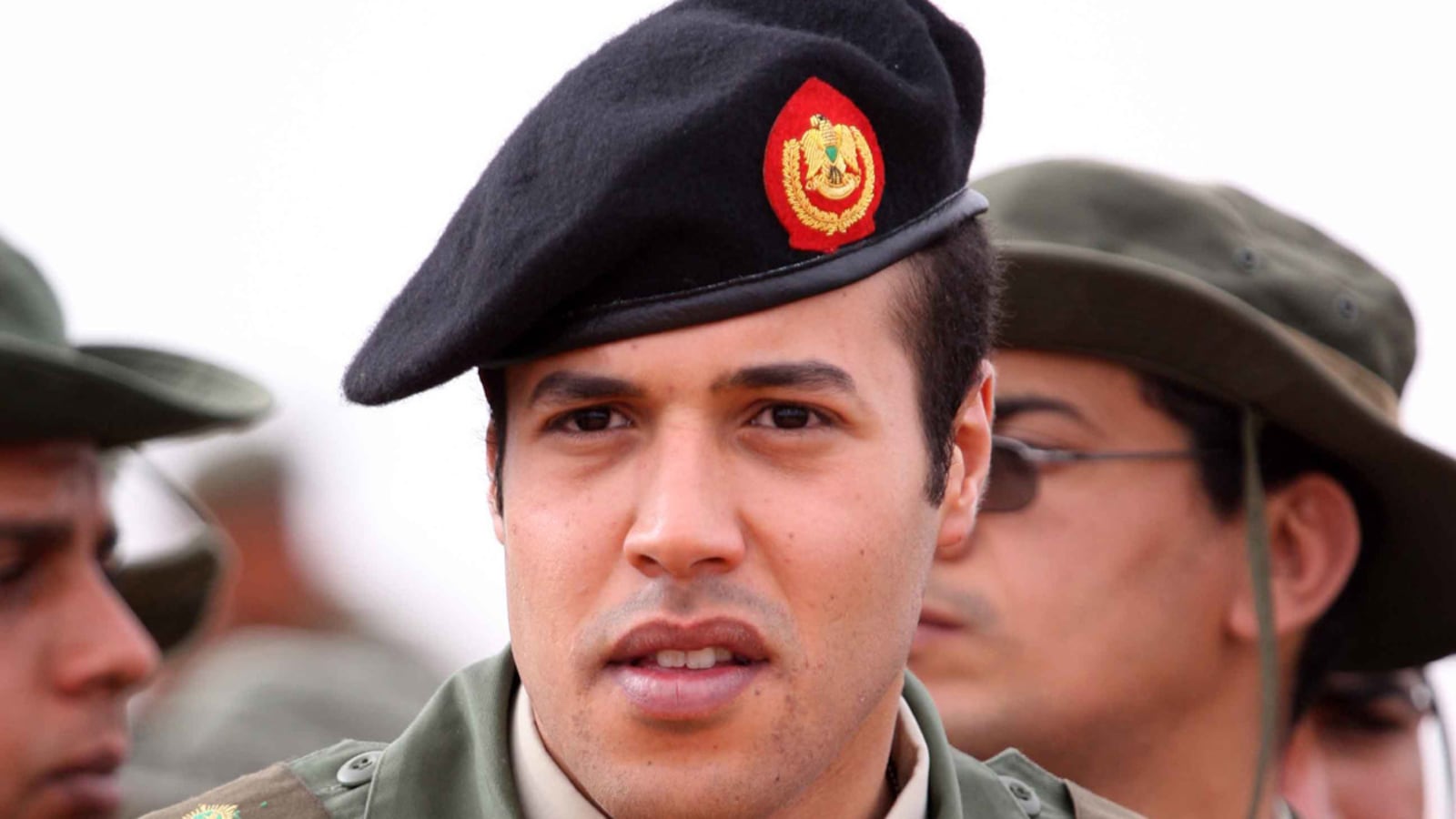TRIPOLI, LIBYA—The seventh and youngest son of Muammar Gaddafi, Khamis, was reported killed Saturday, for the second time in just over a year.
According to the spokesman of Libya’s Parliament—and a tweet put out by the country’s deputy prime minister, Mustafa Abushagur—Kamis was captured in the suspected loyalist town Bani Walid and died soon after.

Most foreign journalists, who requested that the government produce evidence of the claim, met the announcement with skepticism. Khamis, one of the most hated of the Gaddafi sons, was reported dead Aug. 29, 2011, when rebels claimed he had been hit in a NATO airstrike.
After resurrecting Khamis and killing him again, Abushagur also pulled back, tweeting an apology for announcing the death of Khamis before he had confirmation.
The news prompted cacophonous street celebrations in Tripoli with guns blazing, fireworks exploding, and car horns blaring. Celebrations erupted in the town of Misrata, whose militiamen have been launching indiscriminate rocket attacks on Bani Walid the past couple of days, claiming dangerous Gaddafi loyalists remain there. There have been reports of at least a dozen civilian casualties.
The assault on Bani Walid, which was given the green light by Libyan leaders, has prompted protests from human-rights organizations. The U.N. mission in Libya expressed concern about the offensive launched against the town. “In the interests of national reconciliation and long-term stability of the country, a mediated settlement is urgently needed,” said Tarek Mitri, U.N. envoy to Libya. He urged the protection of civilians.
The claim about Khamis came just hours after Libyan leaders announced the arrest of Gaddafi’s elusive former spokesman, Mussa Ibrahim. Government spokesmen claimed Ibrahim had been arrested at a checkpoint in Tarhuna, another town that’s suspected of disloyalty to the post-Gaddafi political order and, like Bani Walid, has suffered raids. “He is being taken to Tripoli, where he will be handed over to the pertinent authorities to begin questioning,” read a statement from the prime minister’s office.
But later the government backed off its claim that the former Gaddafi spokesman had been captured with a government official saying there was no confirmation. Shortly before an audiotape surfaced purportedly of Ibrahim himself denying the news of his arrest.
In the wake of the storming of the U.S. Consulate and the death of Ambassador Christopher Stevens in September, Libyan leaders came out with a series of contradictory statements, ranging from saying they had evidence the attack was carried out by Gaddafi loyalists to arguing that the assault was inspired by al Qaeda. Some government officials even claimed the attack was plotted by Israel as a way to embarrass President Obama.
General Congress President Mohamed Magarief said in broadcast remarks—before all the bewildering announcements of the capture of Ibrahim and the death of Khamis—that “the campaign to liberate the country has not been fully completed.” He singled out Bani Walid, which has been locked in a standoff with Misrata for months, saying that Gaddafi loyalists still posed a threat. “Bani Walid’s misfortune is that it has become a sanctuary for a large number of outlaws and anti-revolutionaries and mercenaries,” Magarief said.
Shortly after his remarks—made to mark the anniversary of the death of Gaddafi, killed Oct. 20, 2011, after being captured near his hometown of Sirte—Mistra militiamen launched Grad rocket attacks on Bani Walid. One family was reported killed in the initial bombardment.
This month Misrata militiamen besieged Bani Walid, the hilltop home of the pro-Gaddafi Warfalla tribe, after militiamen from the town seized and tortured a former rebel credited with capturing Gaddafi. He later died of his injuries. For the past few months both towns have been engaged in kidnappings and murders. Efforts at reconciliation have failed, and Warfalla tribesmen have complained that the Misratans want to wipe Bani Walid off the map, in much the same way as they did during the uprising with the town of Tawerga.
Meanwhile, a protest outside the parliament in central Tripoli in support of Bani Walid turned scrappy with demonstrators firing weapons. Several were injured.
Libya’s new government authorities have appeared, until recently, to want to effect a reconciliation. As the casualties have mounted, their tone has changed. According to a medical officer, nine people from Misrata were killed and 122 wounded from Saturday’s clashes. Libya’s official news agency said the toll was 14 dead, 200 wounded. How many dead there are in Bani Walid is unknown, and Misrata militiamen, with the assistance of official government forces known as the Libyan Shield, have been preventing independent observers from accessing the town.
President Magarief warned that remnants of the former Gaddafi regime had “infiltrated the organs of the state, maybe even its leadership, and are plotting against the revolution with the help of others who are abroad.” He insisted that the attacks on Bani Walid are “not genocide or ethnic cleansing as erroneously claimed by some. It is a campaign to restore legitimacy.”
Amid the swirling rumors and claims and counterclaims, The Daily Beast asked government spokesmen to produce evidence of the capture and death of Khamis. They promised to produce photographs, but had failed to do so several hours after the initial request.
While many Libyans celebrated the claim about Khamis—his body was never found after the NATO airstrike more than a year ago—others expressed skepticism even before the deputy prime minister's second apologetic tweet, arguing that the government was making the assertion in order to divert attention away from the indiscriminate shelling of Bani Walid.






